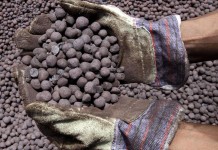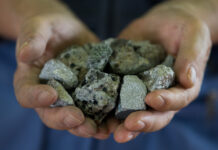
[miningmx.com] — MAJOR mining developments had the potential to “fundamentally change the lives of people and, at a broad level, the prosperity of nations, if done properly”.
That was the message delivered by David Joyce, MD of expansion projects for Rio Tinto’s iron ore group in his presentation on Thursday to the Africa Down Under conference being held in Perth, Australia.
Joyce cited Rio Tinto’s Simandou iron ore mine in Guinea and the group’s coal projects in Mozambique acquired through the takeover of Australian junior Riversdale Mining as examples of this.
He said: “Mining investment tends to require significant outlays of capital upfront which are recouped over long operating periods of 40 years plus. As a result – in most cases – we have a long-term and reliable presence in places where our operations are located.
“There is a growing recognition among many stakeholders that the mining industry is able to make a positive, long-lasting contribution to achieving national priorities and delivering sustainable economic return to the benefit of nations.’
Joyce said this reality meant the model for developing mineral resources would rely increasingly on the establishment of “partnerships not just purely transactional relationships.
“This presents a new operating paradigm for many of the stakeholders involved in the industry – national governments, international institutions, communities, customers and suppliers to name but a few.
“Put simply, we all have skin in the game.’
Joyce said the Simandou project – which was being developed with partners Chalco (Aluminium Corporation of China) and the International Finance Corporation – was the largest government/private partnership in Africa with plans to build a 95mt/year mine along with 650kms of railway line and a four-berth wharf.
He added the project would create more than 4,000 full-time jobs with the first iron ore scheduled to be shipped by mid-2015 after which Guinea would be established as “one of the leading iron ore hubs in the world.’
Turning to Mozambique, Joyce said Rio Tinto was “working closely with the Government of Mozambique to address infrastructure and national development priorities which, in turn, will allow for more timely completion and export of product”.
Joyce said Rio Tinto expected that global iron ore supply needed to increase at the rate of at least 100mt annually over the next eight years to meet demand growth.
“This represents a staggering increase in demand. Importantly, from a supply side perspective, we believe many African countries will be well-placed to meet this growth in demand.’











